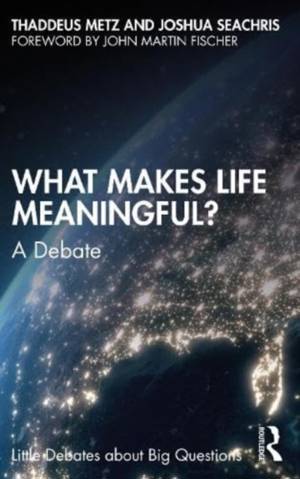
- Afhalen na 1 uur in een winkel met voorraad
- Gratis thuislevering in België vanaf € 30
- Ruim aanbod met 7 miljoen producten
- Afhalen na 1 uur in een winkel met voorraad
- Gratis thuislevering in België vanaf € 30
- Ruim aanbod met 7 miljoen producten
Omschrijving
Can human life be meaningful? What does talk about life's meaning even mean? What is God's role, if any, in a meaningful life? These three questions frame this one-of-a-kind debate between two philosophers who have spent most of their professional lives thinking and writing about the topic of life's meaning.
In this wide-ranging scholarly conversation, Professors Thaddeus Metz and Joshua W. Seachris develop and defend their own unique answers to these questions, while responding to each other's objections in a lively dialog format. Seachris argues that the concept of life's meaning largely revolves around three interconnected ideas--mattering, purpose, and sense-making; that a meaningful human life involves sufficiently manifesting all three; and that God would importantly enhance the meaningfulness of life on each of these three fronts. Metz instead holds that talk of life's meaning is about a variety of properties such as meriting pride, transcending one's animal self, making a contribution, and authoring a life-story. For him, many lives are meaningful insofar as they exercise intelligence in positive, robust, and developmental ways. Finally, Metz argues that God is unnecessary for an objective meaning that suits human nature.
Metz and Seachris develop and defend their own unique answers to these three questions, while responding to each other's objections in a dialog format that is accessible to students though--given their new contributions--will be of great interest to scholars as well.
Key Features
- Offers an up-to-date scholarly conversation on life's meaning by two researchers at the forefront of research on the topic.
- Provides a wide-ranging, yet orderly discussion of the most important issues.
- Accessible for the student investigating the topic for the first time yet also valuable to the scholar working on life's meaning.
- Includes helpful pedagogical features, like:
- Chapter outlines and introductions;
- Annotated reading lists for both students and research-level readers;
- A glossary; and
- Clear examples, thought experiments, narratives, and cultural references, which enhance the book's role in thinking about life's meaning and related topics.
Specificaties
Betrokkenen
- Auteur(s):
- Uitgeverij:
Inhoud
- Aantal bladzijden:
- 252
- Taal:
- Engels
- Reeks:
Eigenschappen
- Productcode (EAN):
- 9781032566153
- Verschijningsdatum:
- 30/11/2023
- Uitvoering:
- Paperback
- Formaat:
- Trade paperback (VS)
- Afmetingen:
- 140 mm x 216 mm
- Gewicht:
- 322 g

Alleen bij Standaard Boekhandel
Beoordelingen
We publiceren alleen reviews die voldoen aan de voorwaarden voor reviews. Bekijk onze voorwaarden voor reviews.









